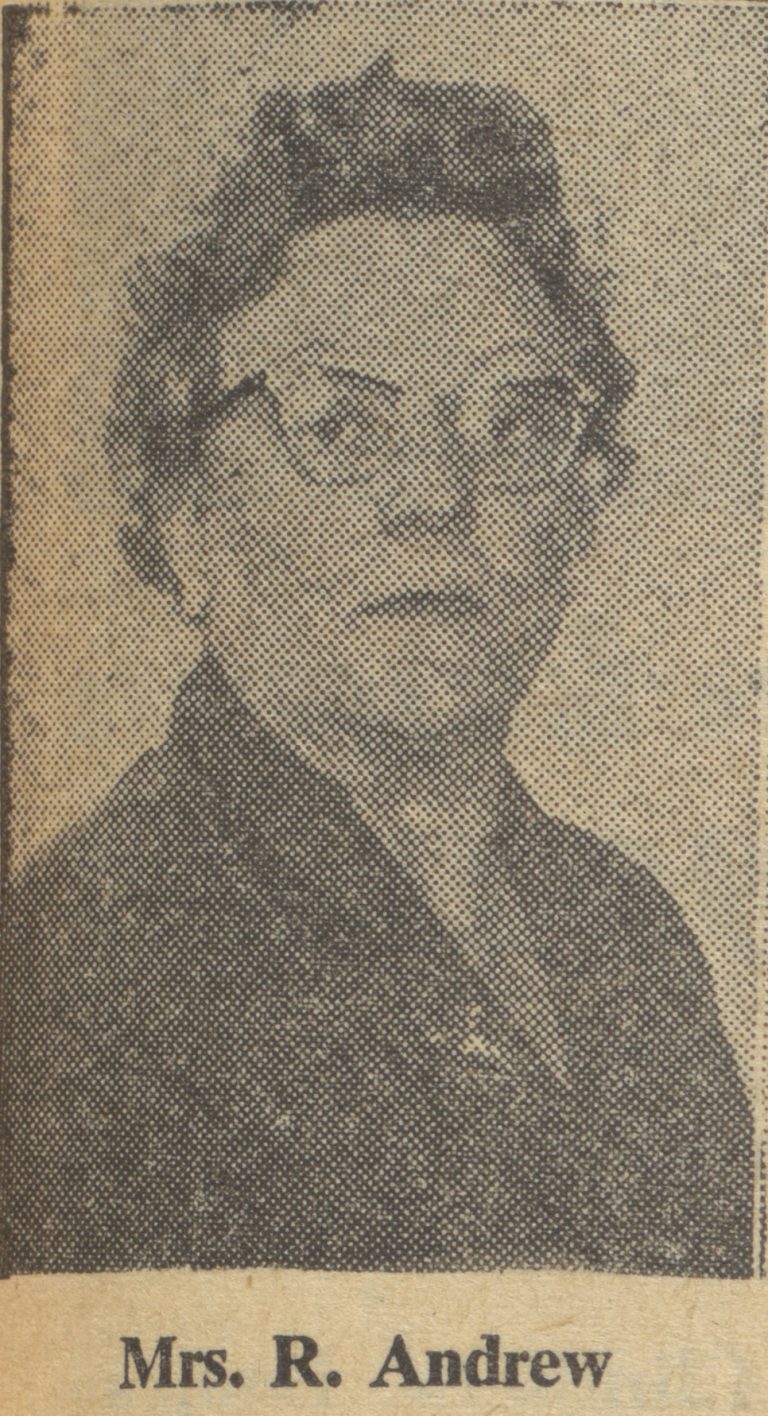- Entry type: Person
- Entry ID: AWE24070410
Andrew, Rose
- Birth name Ashworth, Rose

- Born 23 December 1910, Blackpool, , England
- Died 8 October 1998, Batemans Bay, New South Wales, Australia
- Occupation Community activist, Parliamentarian
Summary
Rose Andrew was elected an independent member of the sixteenth ACT Advisory Council in September 1961. She served one three-year term during which she supported community development such as proposing a heated swimming pool be built in Canberra. One of two female members of the Council, she did not seek re-election in 1964. Prior to being elected to the ACT Advisory Council she was President of the Canberra branch of the Country Women’s Association of Australia (CWA) in 1959.
Details
Rose Andrew was born in Blackpool, England, the daughter of Harvey Ashworth, a farmer, and Alice Hughes. Rose was living at 207 George Street East Melbourne within walking distance of the city of Melbourne and employed as a clerk when she married Walter Dudley Andrew, public servant, at St Peter’s Church of England, East Melbourne on 1 July 1937. At this time, her parents were separated; her father lived in London and her mother was living in Cranbourne, south of Melbourne, then a small farming community.
By the 1950s, the Andrew family was living at 5 Dampier Crescent in the inner south Canberra suburb of Forrest, and Walter was working for the CSIRO. Walter and Rose, known in the family as Posey, had three children John, Robert and Helen. They remained in Canberra apart from a period in 1955, when they were living at Deniliquin, a grazing district in south-west New South Wales, apparently in connection with Walter’s work with the CSIRO.
Back in Canberra, Rose was involved in several community organisations and clubs in the later 1950s including Legacy, the Business and Professional Women’s Association, the Canberra Penguin Club a public speaking club, and the National Council of Women. In 1959, she was president of the local Country Women’s Association. Her concern for community and domestic issues was demonstrated during this period, when she wrote a Letter to the Editor of The Canberra Times concerned about hygiene standards for bread deliveries, and the inconvenience of butchers’ opening hours for households.
Rose Andrew was elected an independent Member of the sixteenth ACT Advisory Council in September 1961. She was one of only two female members in the eight-member Council, joining long-serving Ann Dalgarno, who had been the sole female member in the previous Council.
During her time on the Council, Rose Andrew’s most successful motion was for the construction of a heated swimming pool and ice rink. She argued that Canberra’s climate called for a heated swimming pool so that local swimmers weren’t at a disadvantage to those in warmer parts of Australia. The plan included an ice rink so that residual heat from the rink could be used to heat the pool. This proposal may have paved the way for the pool and ice rink eventually built in Phillip and opened in 1971.
Another significant motion she led was for the establishment of a Milk Authority for the ACT. This came from rises in milk prices which she considered to be exploitative of Canberra buyers, emphasising its effect on housewives. The motion was rejected by the council in June 1962, but she continued to advocate for the change, proposing it again in April 1963. She finally dropped the plan in 1964, after accepting the reasons given by the Minister for the Interior against its implementation.
Her other actions on the Council included leading a motion to ban boxing in the ACT, which was defeated with the Council instead proposing a Boxing Commission to enforce new regulations, and a proposal for a Voluntary Ambulance Contribution Fund, also defeated. She supported the establishment of a local government for the ACT, a motion to end the death penalty in the ACT, and a motion to improve apprentices’ wages and working conditions.
Related to her time on the CWA, she often contributed opinions in support of her female constituents to discussions with the Council. This was evident in her advocacy for the Milk Authority, as well as arguing against increases in bread prices and telephone charges concerned with their effect on Canberra’s housewives.
Rose Andrew did not contest the 1964 election and as far as is known did not take any further part in public life. By the mid-1960s the family had moved to Kandy, Ceylon, and later lived in Argentina, apparently because of Walter’s work.
Rose died at Batemans Bay NSW on 7 October 1998, age 87 years. She was buried in the Anglican Lawn section of Woden Cemetery where her mother had been buried in the next grave nearly 50 years before. Her gravestone gives details of Rose’s rich family life but does not mention her public life.
Published resources
-
- Letters to the Editor: Canberra bread and meat deliveries, 19 February 1955, https://trove.nla.gov.au/newspaper/article/91193455?searchTerm=Rose%20Andrew
- Back in Office, 10 October 1961, https://trove.nla.gov.au/newspaper/article/105896167?searchTerm=Rose%20Andrew
- Council calls for warm swimming pool, 6 November 1962, https://trove.nla.gov.au/newspaper/article/104299775?searchTerm=Rose%20Andrew
- Better pay, conditions sought for apprentices, 22 May 1962, https://trove.nla.gov.au/newspaper/article/130575575?searchTerm=Rose%20Andrew
- Women criticise bread increase, 11 October 1963, https://trove.nla.gov.au/newspaper/article/104270946?searchTerm=Rose%20Andrew